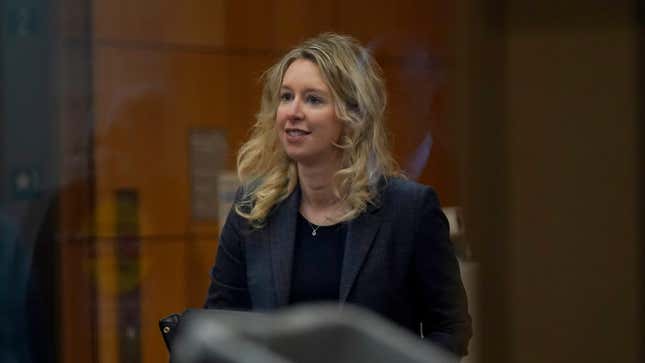
Elizabeth Holmes and her legal defense team are asking for an 18-month period of house arrest, as opposed to the maximum 80 years of potential jail time the Theranos founder faces. In a memo pleading for leniency, Holmes requested that the court “look beyond that caricature,” of her in the media and “examine Ms. Holmes the human being.”
The disgraced entrepreneur was convicted on four counts of fraud against investors in January, each of which carries a maximum penalty of 20 years in prison. Though notably, the jury did not find her guilty of other fraud charges related to the actual patients who received incorrect medical diagnoses as result of her sham blood testing technology. Following the verdict Holmes requested a new trial, but that demand was rebuffed by presiding district court Judge Edward Davila on Monday.
Now, an 82-page document filed late on Thursday is her defense team’s latest move to minimize their client’s prison time. It begins with a description of Holmes’ childhood and includes section titles like: “Ms. Holmes Objects to the Calculation of the Number of Victims,” “Caring and Reliable Friend,” and “Deep Interest in Making the World a Better Place.” In addition to the memo, Holmes also filed hundreds of pages of supporting documents including 130 letters submitted by “individuals who actually know [her].”
Further, the filing recounts traumas endured by Holmes—including an alleged 2003 rape and claims of repeated abuse at the hands of her romantic and business partner, Ramesh “Sunny” Balwani—who was found guilty on 12 counts of fraud in connection to Theranos. The memo cites her recent volunteer work in support of sexual assault survivors as yet another reason why she shouldn’t be sent to jail.
Such filings, known as mitigation reports, are a standard part of criminal defense. They are filed in almost all cases, and often—if a legal team is able, they will be as in-depth as Holmes’.
For a defendant as publicly scorned as the Theranos founder, such mitigation might initially seem like a bad-faith legal maneuver. However, failing to submit a comparable report could actually be deemed malpractice, said Emily Galvin-Almanza, a former California-based public defender and co-founder of the non-profit Partners for Justice, in a text exchange with Gizmodo.
In her time as a public defender, Galvin-Almanza, noted that she and her colleagues worked their hardest to submit as robust mitigation as possible for their clients—including background like childhood and trauma experiences. “It’s a very serious thing, considering taking decades of a human life. It merits considering how they came to be in this position and their likelihood of succeeding if given a chance, ” she wrote. And, as with any widely-publicized trial, what happens to Holmes could set a legal expectation and inform popular opinion.
Unfortunately, as the Stanford dropout is likely to learn firsthand, we live in a carceral state where being nice some of the time and enduring past trauma doesn’t necessarily grant you a get-out-of-jail-free card. On the other hand, being white and wealthy in the white-collar crime sphere will probably lend Holmes some perks. If the judge does opt for a prison sentence, the start-up scammer is likely to serve her time in a low-security facility and end up with a sentence of less than ten years, according to some expert speculation.
Holmes’ official sentencing is scheduled for Nov. 18, and prosecutors will file their own sentencing recommendation for Judge Davila before then. In the meantime, you can read the full extent of Holmes’ request for compassion below.
Update 11/14/2022, 11:48 a.m. ET: This story has been updated with additional context from a legal expert.
Update 11/14/2022, 9:43 a.m. ET: This story has been updated with additional context about standard legal practice